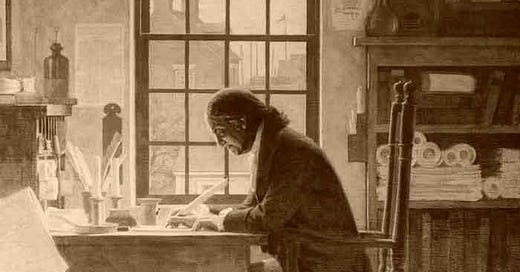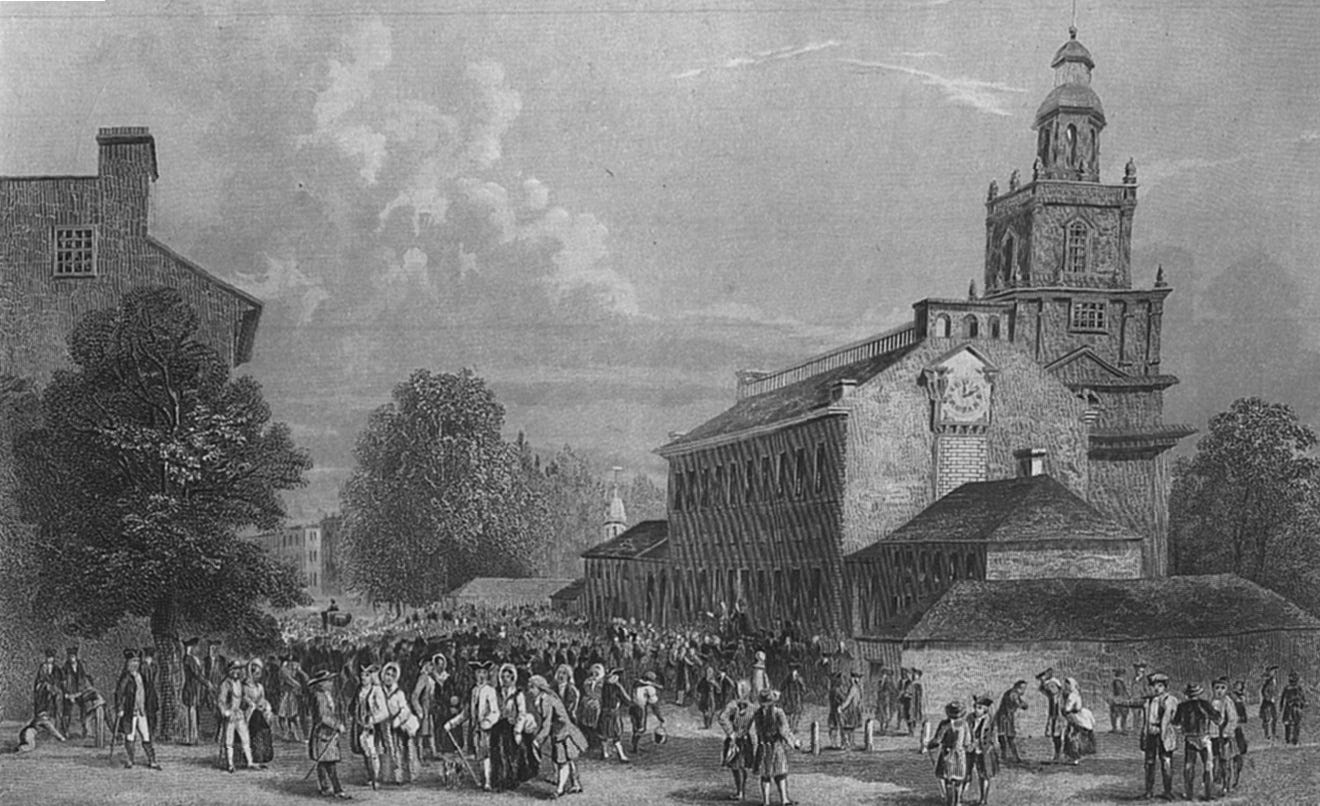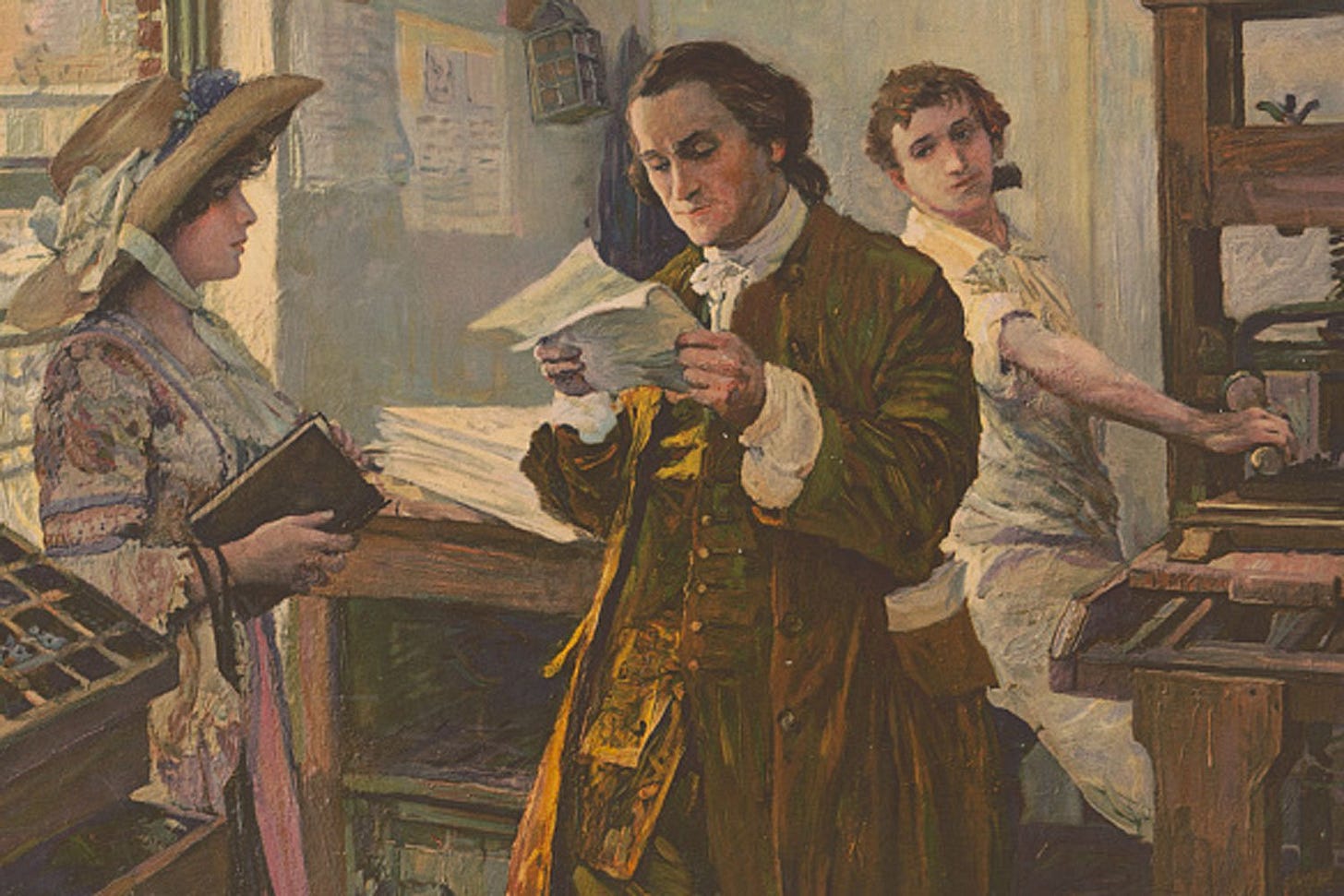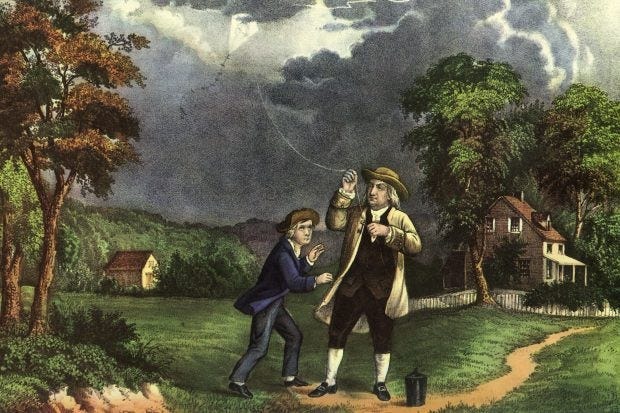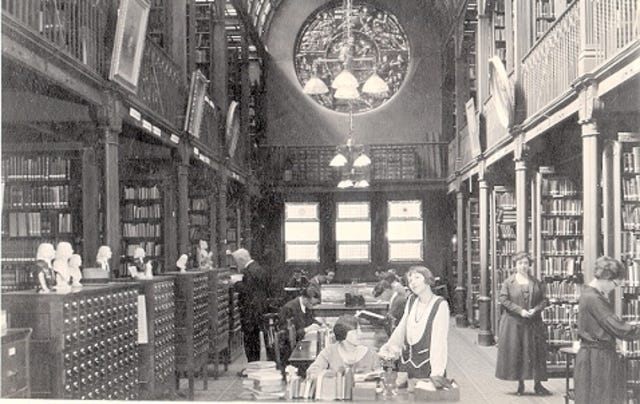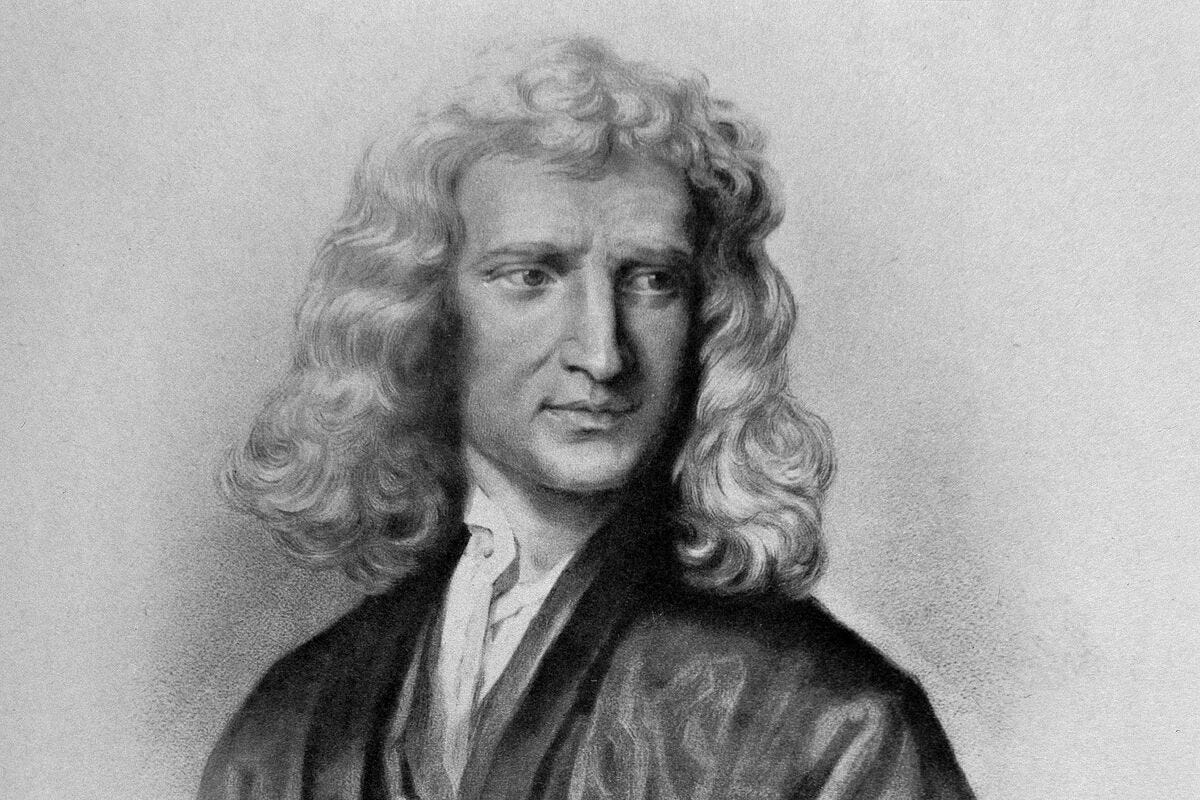“An investment in knowledge pays the best interest”
- Benjamin Franklin
Today, we take a book off the shelf about one of history’s most extraordinary individuals: Benjamin Franklin. This will be the first of many books I cover on him. He is an inspiration for me, and today I hope to leave you inspired too.
Why Benjamin Franklin?
It feels correct to start this series off with the man who got ahead in life thanks to one defining trait: his intellectual edge. Franklin rose to the very top of life thanks to intellect, and I believe it can rise us just the same.
One of the best ways to broaden your intellect is to look at your heroes and discover who their heroes were. By doing so, you uncover the first mover, the innovator who sparked generations of brilliance. Charlie Munger is a common hero for many of us, but do you know who his hero was? Benjamin Franklin. If Franklin was good enough to inspire someone as remarkable as Munger, he certainly deserves our attention.
Franklin’s Life: The Making of a Genius
Before I dive straight into what made him exceptional, I want to tell his story, it is one that deserves to be told. So, here’s a little context:
Humble Beginnings
Benjamin Franklin was born into modest circumstances in Boston, 1706. His early years offered little indication of the towering figure he would become. He entered school aged 8, and at the age of 12 through to 17, he was an apprentice to his brother James, a printer.
It was during these years that Franklin’s appetite for knowledge began to take shape. He devoured books and learnt everything that came his way. Yet, Franklin wasn’t satisfied with the path laid before him in Boston. In 1723, aged 17, he made a daring decision: to abandon his family and go out on his own.
With little money, just the clothes on his back, and a few well-worn books, Franklin left Boston for Philadelphia. He had no plan; only a conviction that the journey would bring opportunity.
Wasting no time, he sought work at the local printer’s shop. His unique mind did not go unnoticed there, and his employer soon sent him to London to set up a shop. Though his boss’s promises of a new shop were found to be empty; in London he spent two years learning, working, and networking.
Franklin’s Boundless Mind
In 1726, at just 20 years old, Franklin returned to Philadelphia. Determined to expand his mind, he formed the “Junto Club” in 1727, where a group of like-minded individuals met to discuss philosophy, politics, art, history, and ideas. They exchanged essays and shared books. The collective intellect of these people transformed Franklin into a true polymath (someone who excels across many disciplines).
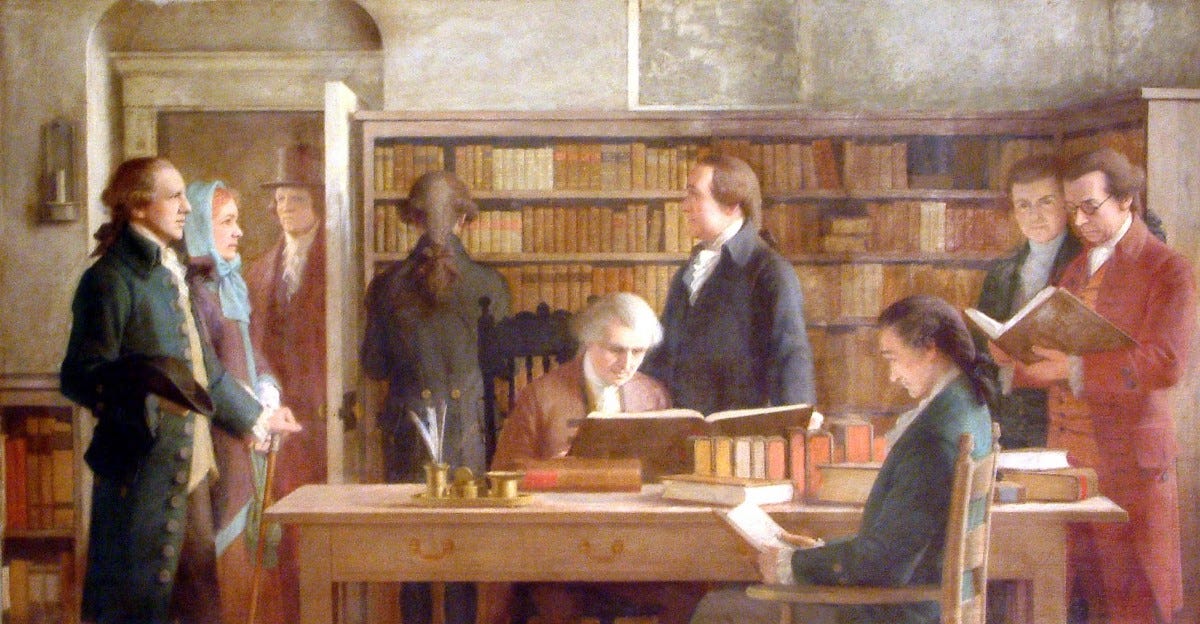
Franklin believed deeply in the power of learning and humility. His early wealth was built not through extravagant ambition but through “industry and frugality”, which reminds me of a quote from the book ‘The Psychology of Money’ where Housel states that wealth is built by:
“Not increasing income, but increasing humility.”
- Morgan Housel
This embodies Franklin’s approach to building wealth, which Charlie Munger echoed. Another trait that Munger echoed was his ferocious appetite for reading. Franklin read for 1–2 hours daily and firmly believed that people and books will offer you more value than money ever will.
In time, Franklin’s entrepreneurial spirit grew. In 1728, he opened his own printing and publishing house, which became his first true success.
A Man of Invention
Franklin never narrowed his mind, his thinking extended far beyond his business. In 1731, he founded the first public library in America, offering knowledge freely to others. By 1733, he had taught himself French, Spanish, Italian, and Latin. By now he is 27, already leading a life with more achievements than most could gather in a lifetime. He believed that “Idleness is the dead sea that swallows all virtues”. This quote leaves me speechless every single time.
He wasn’t merely a man behind a desk, churning out profound quotes and drowning in a sea of books; he was a man of action. In 1736, he formed the first volunteer fire department. In 1742, he invented the Franklin stove, a breakthrough in home heating. And in 1752, he conducted his famous kite experiment, where he proved for the first time ever that lightning was a form of electricity, not bad for a man who made his living as a printer.
The Hands That Shaped a Nation
Franklin’s time was not limited to invention nor business; he played a pivotal role in shaping the very foundation of America.
By 1755, he went so far as to pledge his personal property to raise funds for the army, this made him of course very popular with those above and below him; achieving this level of popularity is no easy task, yet he made being liked by everyone seem effortless. To be honest, I think for him it was effortless; when you have such good nature you become a magnet that constantly attracts love, friendship, respect, and success.
For 20 years, Franklin dedicated himself to public endeavours, which would lead to his role as one of the most influential Founding Fathers of the United States of America. In 1783, he signed the Treaty of Paris, securing America’s freedom from British rule. Once again, not bad for a man who made his living as a printer.
Franklin’s life ended in 1790, aged 84. His legacy, however, endures.
Lessons from a Life Well Lived
Now that you are familiar with his life, let’s talk about the lessons it offers.
Lesson 1: Lifelong Learning
“I constantly see people rise in life who are not the smartest, sometimes not the most diligent, but they are learning machines. They go to bed smarter than when they got up.”
- Charlie Munger
Curiosity and a relentless commitment to learning were the driving forces behind Franklin’s success. He believed in asking questions, challenging assumptions, and exploring the unknown. For Franklin, learning was not confined to one field. He knew that the best way to grow was to learn about everything.
Franklin mastered business, politics, language, and invention. Not as a result of luck or brilliance, his success was built by relentless effort and a constant desire to improve.
Franklin’s simple strategy was to be kind, to work hard, to learn constantly, and to live within your means. These simple ideas made him one of the most influential people to have ever lived. Simplicity is extremely powerful, to see just how powerful, read my episode on Occam’s Razor, linked here. If you are willing to go to sleep every day a little smarter than when you woke, the results over a lifetime will be incomprehensible.
Lesson 2: The Importance of Virtue
“Nothing so likely makes a man’s fortune as virtue.”
- Benjamin Franklin
To have virtue you must have high moral standards. Luckily, Franklin’s advice on moral standards was plentiful. He recommends that you should not ever say you’re 100% sure of something. Begin sentences with “It is to my belief that…” or “I may be wrong but…”. This is echoed in the famous book ‘How to Win Friends and Influence People’ By Dale Carnegie, he believes that beginning your sentence with admittance of you likely being incorrect encourages co-operative behaviour, suggesting you “disarm” the other person by coming across as humble and therefore encouraging a friendly conversation.
Franklin also says that “Nothing that is useful is not honest.”, in life, strive to be honest and deal with honest people; life will give you much fewer nasty surprises if it is full of honesty. Franklin reminds us that “want of modesty is want of sense”; humility is a hallmark of intelligence. It keeps us grounded, open to growth, and connected to others. Wisdom isn’t just about knowing more, it’s about recognising the vastness of what you don’t know. Always be modest, modesty is a package deal that comes with sound judgement. Franklin’s focus on virtue extended so far that he wished to live his life committing no fault, at any time. To do this, he created the 13 virtues, he even used inspirational quotes to help him stick by them. One of them was a line from Cicero: “A single day, lived well and in accordance with your percepts, is to be preferred to sinning immorality.” It brings me peace knowing that Franklin needed a motivational quote to keep him going, he is human after all! Franklin’s 13 virtues provide a window into just how motivated he was in building his character. Each week, he focused on practicing one virtue until it became second nature.
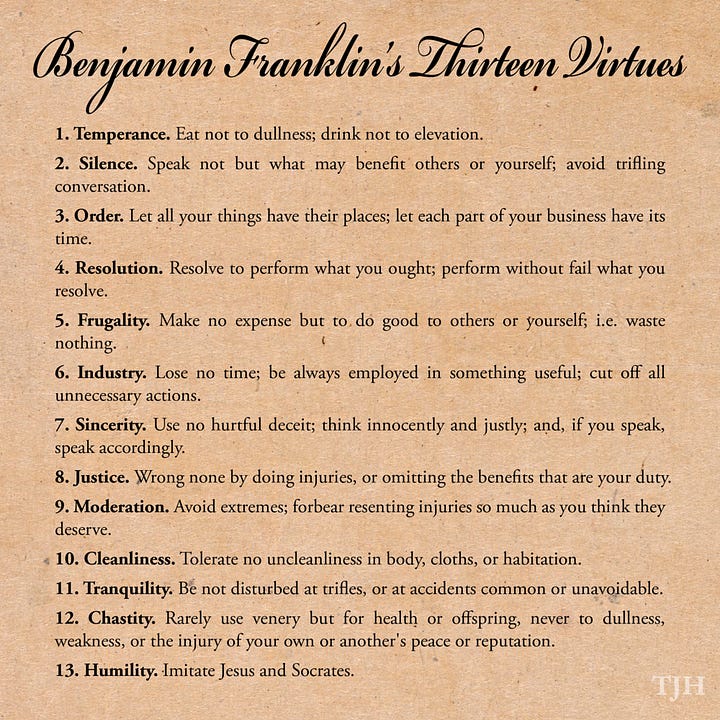
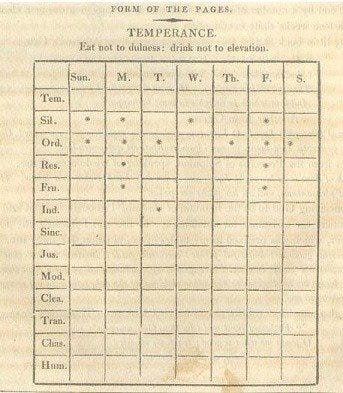
Lesson 3: The Power of Productivity and Habit
“There is no greater harm than that of time wasted.”
- Michelangelo
In all of his endeavours, he wasted absolutely no time. He never procrastinated, there was always a task that needed to be done. If you remove the hours in your day that are wasted on needless activities, you will find that the days are much long enough to make startling progress in life. Let me show you just how powerful saved time can be; if you are 30-years-old, and live till you’re 80-years-old, saving one hour per day will give you an extra two years of time! 2 Years! Think of all the wonderful things you can achieve in 2 years. Franklin knew this, he understood that success is built on consistent, small efforts. If I haven’t yet persuaded you of the power that productivity and habit has, here’s some people that can explain it far better than I can:
“Human felicity is produced not so much by great pieces of good fortune that seldom happen, as by little advantages that occur every day.”
- Benjamin Franklin
“Great things are not done by impulse, but by a series of small things brought together.”
- Vincent Van Gogh
“It's not what we do once in a while that shapes our lives, but what we do consistently.”
- Tony Robbins
“The effects of compounding even tiny advantages over time are simply awesome and often beyond comprehension.”
- Charlie Munger
Save time, and save it consistently. Fill that saved time with good habits.
Franklin’s daily schedule was regimented. From the moment he woke up, he asked, “what good shall I do this day?” His evenings were spent reflecting: "What good have I done today?" This purposeful reflection meant that he could measure which of his habits were benefiting him most, this meant he could utilise his saved time to be most productive.
Lesson 4: Fostering Good Relationships
Franklin understood human psychology, he knew exactly how people operated. In this lesson, it becomes clear just how much of the foundations he laid for Dale Carnegie’s book ‘How to Win Friends and Influence People’.
He said “Men must be taught as though you are not teaching them, and unknown things should be explained as though they were forgotten.” Dale Carnegie said the exact same thing. Ego’s can be often fragile, by teaching this way you give them the impression that “of course I already know what you are talking about, you just reminded me! I’m not stupid..”, this is a great way to teach someone who is easily patronised or annoyed.
Franklin knew from an early age that relationships and goodwill compound over time. Kindness can come back to you decades after it was given away, Warren Buffett is a believer of this too; after all, how many billionaires can you name that have zero enemies. Buffett’s kind approach to his business have resulted in a life free of enemies, in fact, it won’t have just left him with no enemies, it will have absolutely contributed to his wealth. The moral of this story is to be kind, always, with no expectation of reciprocation.
Lesson 5: Be a Creator
“We enjoy great advantages from the inventions of others. We should be glad of an opportunity to serve others by any invention of ours, and this we should do freely and generously.”
- Benjamin Franklin
Among Franklin’s greatest achievements were the lightning rod, bifocal glasses, the first public library, and the first voluntary fire department. These innovations weren’t merely technical, they were Franklin’s embodiment of the idea that invention should serve humanity.
Strive to create things for the good of humanity, I don’t mean to invent a time machine or a spaceship. But, if for example you find a profitable way to do something good in this world, don’t feel obliged to keep it to yourself. The inventor of the seat belt didn’t patent his invention for a reason: humanity deserved it more than he deserved the money. This world will go on after us, leave a legacy you can be proud of.
To Conclude: Standing on the Shoulders of Giants
“If I have seen further than others, it is by standing on the shoulders of giants”
- Sir Isaac Newton
Benjamin Franklin was the first mover in many things, but no one at the top of the pile doesn’t have plenty holding them up; he had many supporters and heroes that guided him when the extent of his knowledge saw him no further. Try to find good people to surround yourself with; strive to meet people with honest intentions, who want the best for you. They can lift you to heights that you didn’t think were possible. Find the right heroes, look up to good people, learn from them, you will most likely become your own hero one day.
Franklin would be in awe of today’s digital world, we have access to infinitely more ‘giants’ than he did, this makes standing on their shoulders a little bit easier. There are thousands of people, books, videos, and articles at the tip of your finger, waiting to be discovered. We are so lucky to be born in a time like today, let’s do him proud and use our good fortune for the right reasons.
My final point for today is to dream big, as big as you can:
“I never arrived at the perfection I had been so ambitious of obtaining, but I was, by endeavor, a better and happier man than I otherwise should have been.”
- Benjamin Franklin
I love this quote. I think we should set enormous goals in life, because if we fail - there is no doubt we will be better people than we were when we started. I encourage you to set that goal that you think is out of reach, work towards that dream that seems impossible. If you fail you will be further ahead in life than if you were to have set an easy goal and not been bothered to grow past it.
I hope Benjamin Franklin has inspired you to dream big, there is absolutely no reason that you can not achieve what you set out for. Just remember: small steps, consistently. As Confucius said - “the man who moves a mountain begins by carrying away small stones”. Ben Franklin moved mountains, and so can you.
Thank you so much for reading, please let me know if his story struck a chord with you, and if you enjoyed this, consider subscribing and sharing so you can support my work.
Sincerely,
The Intellectual edge

